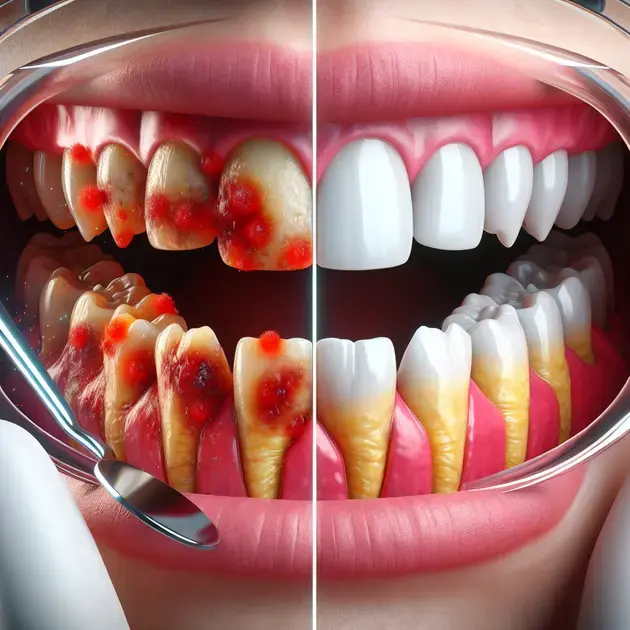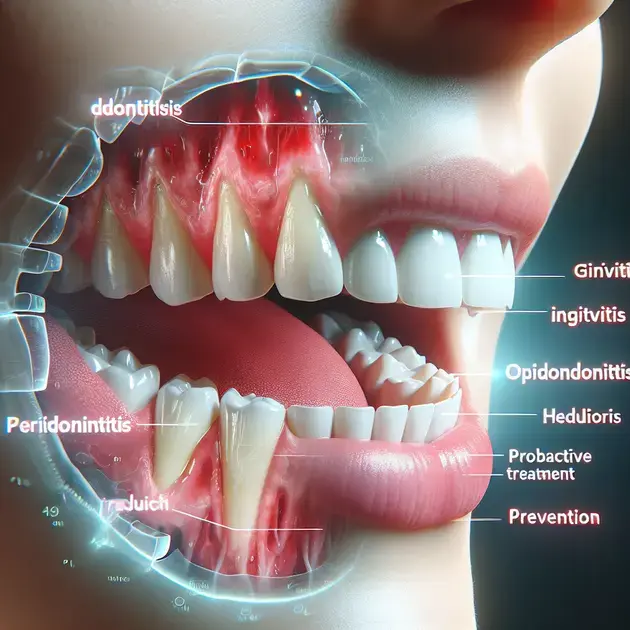Are you struggling with periodontitis and looking for the best medication to treat it effectively? Look no further, as this ultimate guide will provide you with all the information you need to know about the best medications available for periodontitis treatment.
Periodontitis is a common but serious gum infection that damages the soft tissue and destroys the bone that supports your teeth. It can lead to tooth loss if left untreated. Finding the best medication for periodontitis is crucial in managing and treating this condition effectively.

Understanding Periodontitis and Its Impact on Oral Health
Periodontitis is a serious gum infection that damages the soft tissue and destroys the bone that supports your teeth. It can lead to tooth loss and other complications if left untreated. Understanding the causes and effects of periodontitis is crucial for maintaining good oral health.
Causes of Periodontitis:
Periodontitis is primarily caused by poor oral hygiene that allows bacteria to grow and accumulate on the teeth. Other factors such as smoking, hormonal changes, certain medications, and underlying health conditions can also contribute to the development of periodontitis.
Effects of Periodontitis on Oral Health:
Untreated periodontitis can lead to gum recession, tooth sensitivity, chronic bad breath, loose teeth, and eventually tooth loss. In addition to the impact on oral health, research has shown a potential link between periodontitis and systemic conditions such as heart disease and diabetes.
Choosing the Right Medication for Periodontitis Treatment
When it comes to treating periodontitis, medication can play a crucial role in controlling the infection and promoting gum health. However, choosing the right medication for periodontitis treatment requires careful consideration and consultation with a dental professional.
Step 1: Consultation with a Dentist
The first step in choosing the right medication for periodontitis treatment is to schedule a consultation with a dentist or periodontist. They will evaluate the extent of the infection and recommend the most appropriate treatment plan, which may include medications.
Step 2: Prescribed Antibiotics
In some cases, dentists may prescribe antibiotics to help control the bacterial infection causing periodontitis. Common antibiotics used for periodontitis treatment include doxycycline, metronidazole, and amoxicillin. It is important to follow the prescribed dosage and duration to ensure effectiveness.
Tips for Effectively Managing Periodontitis with Medication
In addition to taking medication as prescribed, there are several tips for effectively managing periodontitis and promoting gum health.
Regular Dental Check-ups
Visit your dentist regularly for check-ups and professional cleanings to monitor the progress of periodontitis treatment and prevent further complications.
Maintaining Good Oral Hygiene
Brush and floss your teeth regularly to remove plaque and bacteria that can contribute to periodontitis. Use antimicrobial mouthwash to help control bacteria in the mouth.
Healthy Lifestyle Choices
Avoid smoking, eat a balanced diet rich in nutrients, and manage stress levels to support overall oral health and enhance the effectiveness of medication in treating periodontitis.

**Understanding Periodontitis and Its Impact on Oral Health**
Understanding Periodontitis
Periodontitis is a serious gum infection that damages the soft tissue and destroys the bone supporting your teeth. It can lead to tooth loss and various other health problems if left untreated. The main cause of periodontitis is poor oral hygiene, which allows plaque to build up and harden into tartar.
Some common symptoms of periodontitis include swollen gums, bright red or purplish gums, gums that feel tender when touched, and gums that pull away from your teeth. It’s essential to recognize these symptoms early on to prevent further damage to your oral health.
If left untreated, periodontitis can lead to complications such as receding gums, tooth loss, and even systemic health issues like heart disease and diabetes. Regular dental check-ups and good oral hygiene practices are crucial for preventing and managing periodontitis.
There are various treatment options available for periodontitis, ranging from professional dental cleanings to surgical interventions. It’s essential to consult with your dentist to determine the best course of action for your specific condition.
By understanding the causes and symptoms of periodontitis, you can take proactive steps to maintain good oral health and prevent the progression of this serious gum infection.
The Impact of Periodontitis on Oral Health
Periodontitis can have a significant impact on your oral health, affecting not only your teeth and gums but also your overall well-being. The inflammation and infection caused by periodontitis can lead to the destruction of the tissues that support your teeth, resulting in tooth loss if left untreated.
Furthermore, the bacteria associated with periodontitis can enter your bloodstream and affect other parts of your body, leading to systemic health issues. Research has shown a link between periodontitis and conditions such as heart disease, diabetes, and respiratory infections.
In addition to the physical consequences, periodontitis can also have a profound impact on your quality of life. Tooth loss and gum disease can affect your ability to eat, speak, and smile confidently, impacting your self-esteem and overall well-being.
By managing periodontitis effectively and prioritizing good oral hygiene practices, you can mitigate the impact of this condition on your oral health and overall quality of life. Regular dental check-ups, proper brushing and flossing techniques, and timely treatment are essential for maintaining a healthy mouth and preventing the complications of periodontitis.
Understanding the implications of periodontitis on your oral health can motivate you to take proactive steps to address the condition and protect your smile for years to come.
**
Conclusion
**
In conclusion, understanding periodontitis is crucial for maintaining optimal oral health. This serious gum infection, if left untreated, can result in significant consequences such as tooth loss and systemic health issues like heart disease and diabetes. By recognizing the symptoms early on and prioritizing good oral hygiene practices, individuals can take proactive steps to prevent the progression of periodontitis.
The impact of periodontitis goes beyond just the teeth and gums; it can have far-reaching effects on overall well-being. The inflammation and infection associated with this condition can lead to the destruction of vital tissues supporting the teeth, ultimately affecting one’s ability to eat, speak, and smile confidently. Additionally, the spread of bacteria from periodontitis can contribute to various systemic health problems, underscoring the importance of timely treatment and management.
By effectively managing periodontitis through regular dental check-ups, appropriate treatment, and consistent oral hygiene routines, individuals can mitigate its impact on both oral health and quality of life. Understanding the implications of this condition serves as a motivator for individuals to take the necessary steps in preserving their oral health and safeguarding their smiles for years to come.



